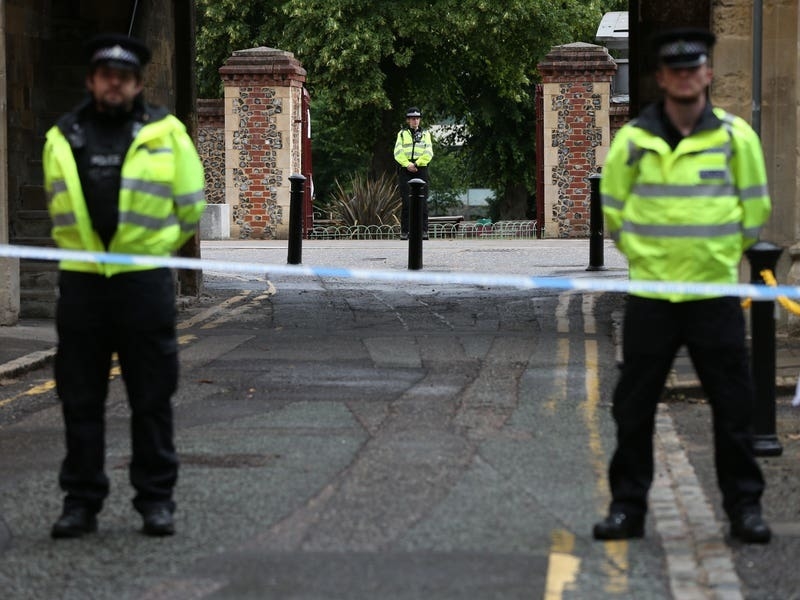A “controlling” man murdered his partner who was about to leave him then sent text messages to suggest she had gone away, a trial has heard.
The body of 30-year-old Madison Wright was found in Wat Tyler Country Park in Pitsea, Essex, on July 30 last year, eight days after she was last seen, Basildon Crown Court was told.
Gary Bennett, 37, of Caister Drive, Pitsea, has denied her murder, and wept in the secure dock as his trial began.
Tracy Ayling KC, opening the prosecution case on Tuesday, told jurors that Ms Wright was last seen on July 22 2022.
Ms Wright worked as a cleaner and attended an appointment cleaning a client’s house, where she was booked from 9am to 11am that day, the prosecutor said.
A Ring doorbell camera filmed her leaving the appointment and an ANPR (automatic number plate recognition) camera recorded her car travelling towards Bennett’s address, the prosecutor said.
In text messages read to the court by the prosecutor, Ms Wright had told Bennett on the morning of July 22 “you’re too controlling”.
Ms Wright also told Bennett: “I’ve not been happy for ages – we’ve had lots of chances to try to make it work but I just don’t think it is.”
Ms Ayling said Bennett missed an NHS appointment at 11.10am that day.
She said the defendant later told police that Ms Wright arrived at his flat at around 11.20am and “was here for about 10 minutes at the most – throughout she said we needed time apart”.
The prosecutor said Bennett told police: “I didn’t consider this to be a break-up, but instead that we needed some space.”
Ms Ayling said Ms Wright was “at one time married”.
She added that Ms Wright was still in contact with her husband while she was in a relationship with Bennett.
Ms Ayling said that at 12.57pm on July 22 Ms Wright’s phone sent a message to her husband to say that “some stuff has come up at my place that I need to sort out, sorry”.
Ms Ayling said: “It’s the crown’s case that he (Bennett) himself was in possession of Madison’s phone and was setting this message up as a sort of alibi that she had gone somewhere and he was not responsible for her disappearance.
“It’s the crown’s case he (Bennett) had already killed her and was sending these text messages himself.”
Ms Ayling said Bennett had travelled to a pawnbroker’s shop in Grays and sold a necklace that Ms Wright was wearing that day for £310.
She said that the necklace was found to have Ms Wright’s DNA on but was missing its distinctive “M” which has not been found.
At 1.35pm Ms Wright’s phone was turned off, Ms Ayling said.
The prosecutor said Bennett had messaged Ms Wright’s phone at 1.48pm asking if he had been “blocked”, adding: “You come and see me for like five minutes after work then left and told me not to come after you.”
Ms Ayling said Bennett had owed money to people.
She said that at 11.42am on July 22 Ms Wright’s phone logged onto a banking app, using fingerprint recognition, and two amounts of money were sent to Bennett’s account – £550 and £400.
“That not only emptied her (Ms Wright’s) account but puts her into the red,” said Ms Ayling.
She said that you “don’t need a live finger or thumb to access the account” as long as the print is recognised.
Ms Ayling said Bennett later withdrew cash from an ATM in a shop and messaged people about transferring them money.
The prosecutor said: “It would appear Mr Bennett now has money to pay those he appears to owe.”
Ms Ayling said police found Ms Wright’s body at Wat Tyler Country Park on July 30.
“Her body was covered in a pile of shrubs and branches and a fence panel,” she said.
“It’s the prosecution case that this defendant killed Madison Wright.
“They were in a relationship up until the time of her disappearance, although, looking at her text messages, the Crown say she was about to end that relationship, mainly because of his controlling behaviour.”
Ms Ayling said Bennett sent a message to Ms Wright’s phone on July 24 saying “talk to me Madison”.
The prosecutor said: “We say he had just buried her.”
The trial, due to last around three weeks, continues.






